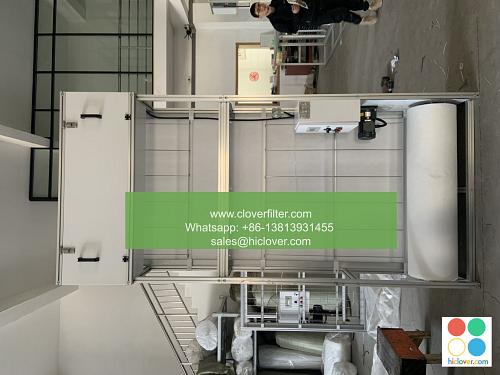Hamilton Steel Plant’s Journey to Cleaner Air: The Adoption of Automatic Roll Air Filters

Hamilton Steel Plant has been a cornerstone of the local economy for decades, providing employment opportunities and contributing to the region’s industrial growth. However, the plant’s operations have also had a significant impact on the environment, particularly when it comes to air quality. The steel production process involves various stages that generate airborne pollutants, including particulate matter, carbon monoxide, and volatile organic compounds. These emissions can have severe consequences for the health and well-being of nearby communities, as well as the environment as a whole.
In recent years, Hamilton Steel Plant has taken significant steps towards reducing its environmental footprint. One of the key initiatives has been the adoption of automatic roll air filters, a technology designed to capture airborne pollutants and improve overall air quality. The implementation of this technology has been a major milestone in the plant’s journey towards cleaner air, and has had a positive impact on both the local community and the environment.
The automatic roll air filter system works by using a series of filters to capture airborne pollutants, including particulate matter, gases, and vapors. The filters are designed to be self-cleaning, using a combination of air jets and vibration to remove captured pollutants and maintain optimal filtration efficiency. This technology has been shown to be highly effective in reducing emissions from industrial sources, and has been widely adopted in various sectors, including steel production.
The decision to adopt automatic roll air filters at Hamilton Steel Plant was the result of a comprehensive review of the plant’s operations and environmental impact. The plant’s management recognized the need to reduce emissions and improve air quality, not only to comply with regulatory requirements but also to minimize the plant’s impact on the local community. After conducting a thorough evaluation of various technologies, the plant’s management selected the automatic roll air filter system as the most effective solution for reducing airborne pollutants.
The implementation of the automatic roll air filter system at Hamilton Steel Plant involved a significant investment of time, resources, and capital. The plant’s management worked closely with suppliers and contractors to design, install, and commission the new system, ensuring that it was integrated seamlessly into the plant’s existing operations. The project required careful planning and coordination, including training for plant personnel and the development of new maintenance procedures.
Since the implementation of the automatic roll air filter system, Hamilton Steel Plant has seen a significant reduction in airborne pollutants. The plant’s emissions have decreased substantially, resulting in improved air quality for the local community. The plant’s management has also reported a reduction in maintenance costs, as the new system has reduced the frequency of filter replacements and other maintenance tasks. Additionally, the plant has seen an improvement in product quality, as the reduced levels of airborne pollutants have resulted in fewer defects and inconsistencies in the steel production process.
The adoption of automatic roll air filters at Hamilton Steel Plant is a testament to the plant’s commitment to environmental sustainability and social responsibility. The plant’s management recognizes that reducing emissions and improving air quality is not only a regulatory requirement, but also a moral obligation to the local community and the environment. By investing in this technology, the plant has demonstrated its dedication to minimizing its environmental footprint and promoting a healthier, more sustainable future for generations to come.
In conclusion, Hamilton Steel Plant’s journey to cleaner air has been a significant success, thanks in large part to the adoption of automatic roll air filters. The plant’s commitment to environmental sustainability and social responsibility has resulted in a substantial reduction in airborne pollutants, improved air quality, and a range of other benefits. As the plant continues to operate and evolve, it is likely that we will see further innovations and initiatives aimed at reducing emissions and promoting sustainability.
Conclusion
Hamilton Steel Plant’s adoption of automatic roll air filters is a significant step towards a cleaner, healthier, and more sustainable future. The plant’s commitment to environmental sustainability and social responsibility has resulted in a range of benefits, from improved air quality to reduced maintenance costs. As the plant continues to innovate and evolve, it is likely that we will see further reductions in emissions and a continued commitment to promoting a healthier environment for the local community.
FAQs
A: An automatic roll air filter is a type of air filtration system that uses a series of filters to capture airborne pollutants. The filters are designed to be self-cleaning, using a combination of air jets and vibration to remove captured pollutants and maintain optimal filtration efficiency.
A: The benefits of using automatic roll air filters at Hamilton Steel Plant include a significant reduction in airborne pollutants, improved air quality, reduced maintenance costs, and improved product quality.
A: The adoption of automatic roll air filters at Hamilton Steel Plant has resulted in improved air quality for the local community, reducing the negative impacts of airborne pollutants on health and well-being.
A: Hamilton Steel Plant is committed to ongoing innovation and improvement, and is exploring a range of other initiatives aimed at reducing emissions and promoting sustainability. These may include the adoption of new technologies, changes to operational practices, and investments in renewable energy and other sustainable systems.

